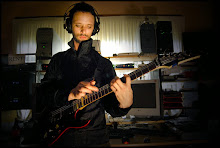Forum Wk 2 – ‘Originality in Music’
Forum Wk 2 – ‘Originality and S. Whittington’:
Nice to see a semi return to the workshop format from last year. This would have been a preferable environment in ‘06 on occasion, as some interesting insight was offered in-between musical examples of derivation and quasi plagiarism, rather than the sit and absorb bombardment of afore.
Some questions were bandied about, such as “Is all art derivative?” and “What is the value of originality?” to mention a couple. I think it may be historically easy to prove the derivative roots of most forms of art. Even one of those modernist avant-garde freaks like John Cage couldn’t say he was just noodling away as a conventional composer, and then plucked something like ‘Williams Mix’ out of thin air. I believe it is the small steps toward original thinking that brave (perhaps ‘enlightened’) people take that eventually creates something truly different. But a challenging piece of art is usually not that out there at the time it becomes noticed (I’m sure there are exceptions and this also depends on who is receiving it, so I’m being careful not to deal in absolutes). If we could take a piece like Williams Mix back to 1800 or earlier in a time machine however, we could rest assured that the Ye-oldies whom we selected to hear it should regard it as completely original, given that nothing even remotely of that nature would have been heard before. Then we would be rightly burnt at the stake for being the witches that we are…

I side with Walter Benjamin to some extent on his view that all music has a certain aura that is lost on reproduction. Even with the fantastic recording and reproducing technology that we enjoy today, I still get much more exited to see someone I appreciate play live, than I do when listening to a new CD.
Getting back to the subject of derivation, surely it would be difficult to construct a more derivative approach than the styles of John Zorn and Christian Marclay? The very nature of the compositional process for these two is unavoidably derivative, yet they know this and persevere anyway, so is derivative really a dirty word in composing circles?

Discussion eventually moving on to the subject of Computer Generated Music raised some eyebrows I’m sure. Who would have thought that a well schooled musician like Stephen would let the ‘human composers may soon be irrelevant’ cat out of the bag – I guess he wont be cheating himself out of a job, but the very idea is formidable enough to conjure grateful feelings toward my flexible choice of study path. However, I’ve heard a couple of these computer-composed pieces this year, and I’m really not convinced that they have all of what it takes to reach out to people. They may be able to instantly create harmonic and contrapuntal perfection, but so often it seems to be a certain degree of human ‘imperfection’ that people respond to in music, I mean try listening to the White Stripes (shudder). I find it hard to imagine a PC coming up with a concept so commercially successful, yet that is so removed from the evolution of music…
Reference:
Stephen Wittington. ‘Forum – ‘Originality in Music’. Lecture presented at EMU Space, Schulz Building, 5th Floor, Adelaide University. Thursday 8th March 2007.


6 Comments:
This comment has been removed by the author.
I agree with your comments on the music of Zorn and Marclay as being derivative... But the moment we choose to use any note from the chromatic scale these days, it must be derivative also... meaning someone else has already been there, done that. Unless the context itself is utterly original. That means someone must invent some new musical notes and while they're at it, some new prime colours for the rainbow. That's original. Otherwise, we should all just burn to a stake.
QUOTE: "I mean try listening to the White Stripes (shudder). I find it hard to imagine a PC coming up with a concept so commercially successful, yet that is so removed from the evolution of music..."
Well said.
I wrote an essay last year on 'The Immortality of Organic Imperfection', where I rabbit on about how music created by humans is perfect in its imperfections, a naturalism that can never be simulated by a computer. I ended it with "When we tire of fabricated sound, the inevitable revolt against digitism will attest that life cannot be defined by zeros and ones. Nothing organic is discrete. Unfortunately this is the essay that escaped the pigeonholes before I could collect it, so I never found out Mark's thoughts...
This comment has been removed by the author.
Pity about the lack of feedback on your essay - you can sure piece together words, my learned voiceover talent :-) It's interesting to note however that we humans even have this concept of "perfection" if indeed we have never observed it... although maybe you might differ with me on that one? If not however, then I wonder what such a notion ultimately signifies?
I think my hair looked almost perfect today...
Post a Comment
<< Home